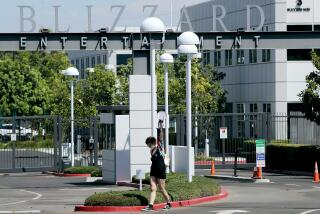Disney cuts 1,900 jobs at theme parks
In a sign that the recession is cutting into Walt Disney Co.’s parks and resorts business, the company said Friday that it eliminated about 1,900 jobs at its domestic theme parks.
The bulk of the cuts occurred at Walt Disney World in Orlando, Fla., where about 1,400 jobs were eliminated. About 300 jobs will be cut from the Disneyland Resort in Anaheim, with the remainder coming from corporate headquarters in Burbank.
Disney, which employs about 80,000 people in its parks and resorts unit, said 1,200 people were laid off and about 700 positions were left unfilled.
The entertainment giant set the stage for the job reductions in February, when it announced a reorganization of its parks and resorts operation. The company didn’t say at the time how many positions would be eliminated.
The cuts signal that Disney is bracing for an extended downturn as consumers continue to keep their wallets closed.
“The recession, and the recent decline, has really hit the theme park industry, but it has hit the destination parks more than the regional parks,” said Edward Shaw, an associate with Economics Research Associates, a consultant to the travel industry. “People are staying closer to home.”
Other Southern California amusement parks say they have avoided major layoffs.
Six Flags Magic Mountain, Legoland and Knott’s Berry Farm say they have had no job cuts in recent months, and Universal Studios spokesman Eliot Sekuler said the company laid off a few dozen workers at the theme park in December as part of an overall belt-tightening at NBC Universal. There are no plans for further layoffs, he said.
Travel experts say the vacation industry is reeling from the effects of the weak economy. Consumers are worried about job security as the nation’s jobless rate reached its highest level in more than a quarter century. Businesses also are curtailing trips.
All of these things are taking a toll on hotel bookings and air travel -- two bellwethers of the health of the travel business.
“The downturn that has occurred in the hotel industry since September is much worse than anybody anticipated,” said Bruce Baltin, senior vice president of PKF Consulting, a hospitality industry consulting firm in Los Angeles. “We’ll come out of this downturn as we have all others, but it may not be until 2010.”
Orlando, home to Disney’s sprawling 25,000-acre Walt Disney World resort, has been particularly hard-hit. The number of passengers traveling to Orlando International Airport declined 14% in February compared with a year earlier, the Greater Orlando Aviation Authority said. Hotel bookings are off by double digits, according to Smith Travel Research, which tracks the lodging industry but does not have access to bookings in Disney hotels.
Hotel occupancy rates in Orlando fell more than 10% in January and February compared with the same time a year earlier. Last month, bookings through March 28 plummeted 20% from a year earlier, Smith Travel said.
Disneyland’s home base of Anaheim experienced a similar drop in hotel occupancy rates.
Bookings fell nearly 12% for January and February compared with a year ago, and dropped in March by nearly 15%, according to Smith Travel. The number of passengers flying into Los Angeles International Airport is off by 4.6 million in January, a decrease of 11.2% from 2008, according to the Los Angeles Convention and Visitors Bureau.
Orange County’s John Wayne Airport experienced an even more dramatic 17% drop in the number of passengers in February.
These grim economic indicators don’t bode well for Disney’s parks and resort business, which accounts for more than a quarter of its operating income and revenue. The company declined to provide information about park attendance before its second-quarter results are released May 5.
Attendance at Disney’s domestic parks fell 5% in the three-month period that ended Dec. 27. Disney started this year with promotions aimed at increasing attendance, such as free admission for people on their birthdays and a deal that offered a week’s stay at a Disney hotel for the price of four nights.
--
Times staff writer Hugo Martin contributed to this report.
More to Read
Inside the business of entertainment
The Wide Shot brings you news, analysis and insights on everything from streaming wars to production — and what it all means for the future.
You may occasionally receive promotional content from the Los Angeles Times.










